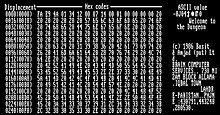
Back Rekenaarvirus Afrikaans Computervirus ALS فيروس حاسوب Arabic কম্পিউটাৰ ভাইৰাছ Assamese Virus informáticu AST Virus proqramları Azerbaijani Камп’ютарны вірус Byelorussian Кампутарны вірус BE-X-OLD Компютърен вирус Bulgarian कंप्यूटर वायरस Bihari

A computer virus[1] is a type of malware that, when executed, replicates itself by modifying other computer programs and inserting its own code into those programs.[2][3] If this replication succeeds, the affected areas are then said to be "infected" with a computer virus, a metaphor derived from biological viruses.[4]
Computer viruses generally require a host program.[5] The virus writes its own code into the host program. When the program runs, the written virus program is executed first, causing infection and damage. By contrast, a computer worm does not need a host program, as it is an independent program or code chunk. Therefore, it is not restricted by the host program, but can run independently and actively carry out attacks.[6][7]
Virus writers use social engineering deceptions and exploit detailed knowledge of security vulnerabilities to initially infect systems and to spread the virus. Viruses use complex anti-detection/stealth strategies to evade antivirus software.[8] Motives for creating viruses can include seeking profit (e.g., with ransomware), desire to send a political message, personal amusement, to demonstrate that a vulnerability exists in software, for sabotage and denial of service, or simply because they wish to explore cybersecurity issues, artificial life and evolutionary algorithms.[9]
As of 2013, computer viruses caused billions of dollars' worth of economic damage each year.[10] In response, an industry of antivirus software has cropped up, selling or freely distributing virus protection to users of various operating systems.[11]
- ^ "The Internet comes down with a virus". The New York Times. August 6, 2014.
- ^
- Stallings, William (2012). Computer security : principles and practice. Boston: Pearson. p. 182. ISBN 978-0-13-277506-9.
- "Worm vs. Virus: What's the Difference and Does It Matter?". Avast Academy. Avast Software s.r.o. Retrieved 9 March 2021.
- ^ Piqueira, Jose R.C.; de Vasconcelos, Adolfo A.; Gabriel, Carlos E.C.J.; Araujo, Vanessa O. (2008). "Dynamic models for computer viruses". Computers & Security. 27 (7–8): 355–359. doi:10.1016/j.cose.2008.07.006.
- ^
- Alan Solomon (2011-06-14). "All About Viruses". VX Heavens. Archived from the original on 2012-01-17. Retrieved 2014-07-17.
- Aycock, John (2006). Computer Viruses and Malware. Springer. p. 14. ISBN 978-0-387-30236-2.
- ^ "Worm vs. Virus: What's the Difference and Does It Matter?". Avast Academy. Avast Software s.r.o. Retrieved 9 March 2021.
- ^ Yeo, Sang-Soo. (2012). Computer science and its applications : CSA 2012, Jeju, Korea, 22-25.11.2012. Springer. p. 515. ISBN 978-94-007-5699-1. OCLC 897634290.
- ^ Yu, Wei; Zhang, Nan; Fu, Xinwen; Zhao, Wei (October 2010). "Self-Disciplinary Worms and Countermeasures: Modeling and Analysis". IEEE Transactions on Parallel and Distributed Systems. 21 (10): 1501–1514. doi:10.1109/tpds.2009.161. ISSN 1045-9219. S2CID 2242419.
- ^
- Filiol, Eric (2005). Computer viruses: from theory to applications. Springer. p. 8. ISBN 978-2-287-23939-7.
- Harley, David; et al. (2001). Viruses Revealed. McGraw-Hill. p. 6. ISBN 0-07-222818-0.
- Ludwig, Mark A. (1996). The Little Black Book of Computer Viruses: Volume 1, The Basic Technologies. American Eagle Publications. pp. 16–17. ISBN 0-929408-02-0.
- Aycock, John (2006). Computer Viruses and Malware. Springer. p. 27. ISBN 978-0-387-30236-2.
- ^ Bell, David J.; et al., eds. (2004). "Virus". Cyberculture: The Key Concepts. Routledge. p. 154. ISBN 9780203647059.
- ^ "Viruses that can cost you". Archived from the original on 2013-09-25.
- ^ Granneman, Scott. "Linux vs. Windows Viruses". The Register. Archived from the original on September 7, 2015. Retrieved September 4, 2015.
© MMXXIII Rich X Search. We shall prevail. All rights reserved. Rich X Search